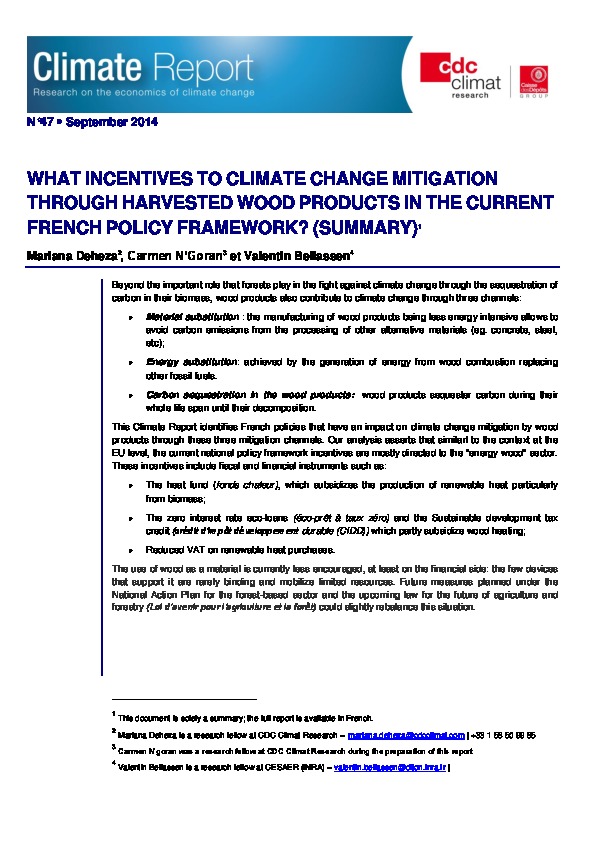What incentives to climate change mitigation through harvested wood products in the current french policy framework? (Summary)
Beyond the important role that forests play in the fight against climate change through the sequestration of carbon in their biomass, wood products also contribute to climate change through three channels:
![]() Material substitution : the manufacturing of wood products being less energy intensive allows to avoid carbon emissions from the processing of other alternative materials (eg. concrete, steel, etc);
Material substitution : the manufacturing of wood products being less energy intensive allows to avoid carbon emissions from the processing of other alternative materials (eg. concrete, steel, etc);
![]() Energy substitution: achieved by the generation of energy from wood combustion replacing other fossil fuels.
Energy substitution: achieved by the generation of energy from wood combustion replacing other fossil fuels.
![]() Carbon sequestration in the wood products: wood products sequester carbon during their whole life span until their decomposition.
Carbon sequestration in the wood products: wood products sequester carbon during their whole life span until their decomposition.
This Climate Report identifies French policies that have an impact on climate change mitigation by wood products through these three mitigation channels. Our analysis asserts that similarl to the context at the EU level, the current national policy framework incentives are mostly directed to the “energy wood” sector. These incentives include fiscal and financial instruments such as:
![]() The heat fund (fonds chaleur), which subsidizes the production of renewable heat particularly from biomass;
The heat fund (fonds chaleur), which subsidizes the production of renewable heat particularly from biomass;
![]() The zero interest rate eco-loans (éco-prêt à taux zéro) and the Sustainable development tax credit (crédit d’impôt développement durable (CIDD)) which partly subsidize wood heating;
The zero interest rate eco-loans (éco-prêt à taux zéro) and the Sustainable development tax credit (crédit d’impôt développement durable (CIDD)) which partly subsidize wood heating;
![]() Reduced VAT on renewable heat purchases.
Reduced VAT on renewable heat purchases.
The use of wood as a material is currently less encouraged, at least on the financial side: the few devices that support it are rarely binding and mobilize limited resources.
Future measures planned under the National Action Plan for the forest-based sector and the upcoming law for the future of agriculture and forestry (Loi d’avenir pour l’agriculture et la forêt) could slightly rebalance this situation.
